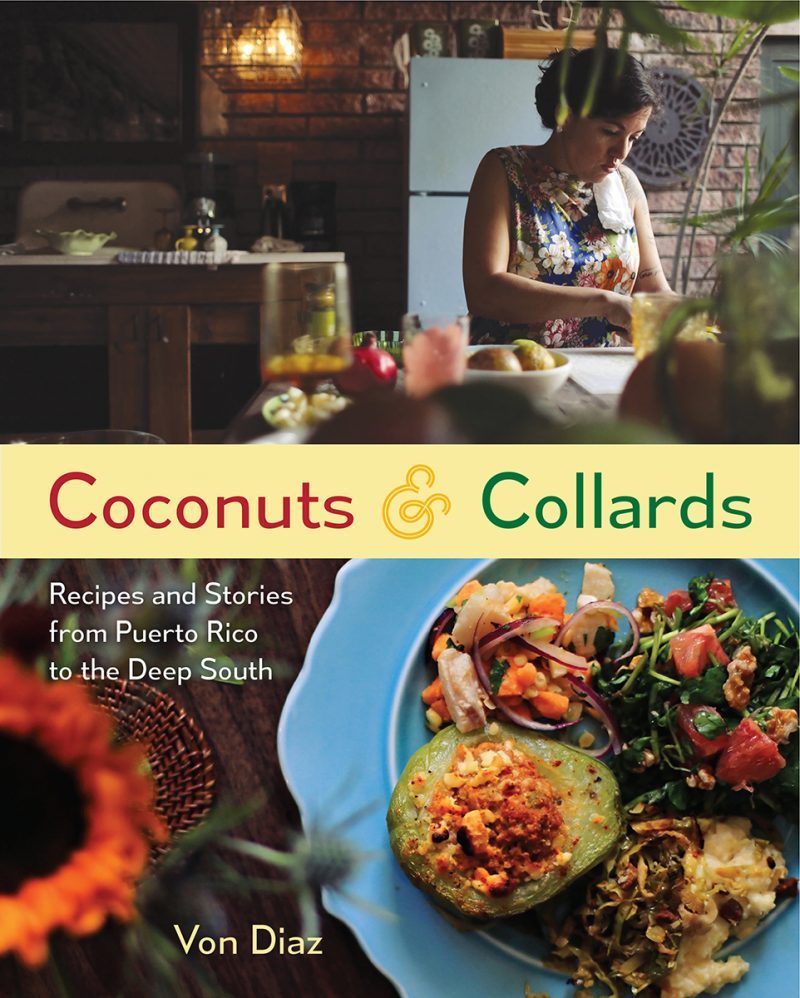
COCONUTS AND COLLARDS: Recipes and Stories from Puerto Rico to the Deep South
Von Diaz
University Press of Florida
March 13, 2018
$28/Hardcover
ISBN-13: 978-0813056654
Von Diaz
University Press of Florida
March 13, 2018
$28/Hardcover
ISBN-13: 978-0813056654
 Von Diaz is a writer and radio producer based in New York. Her work has been featured on NPR, American Public Media, StoryCorps, WNYC, The Splendid Table, PRI’s The World, The Kitchn, and BuzzFeed.
Von Diaz is a writer and radio producer based in New York. Her work has been featured on NPR, American Public Media, StoryCorps, WNYC, The Splendid Table, PRI’s The World, The Kitchn, and BuzzFeed.
When her family moved from Puerto Rico to Atlanta, Von Diaz traded plantains, roast pork, and Malta for grits, fried chicken, and sweet tea. Brimming with humor and nostalgia, COCONUTS AND COLLARDS is a recipe-packed memoir of growing up Latina in the Deep South.
The stories center on the women in Diaz’s family who have used food to nourish and care for one another. When her mother—newly single and with two young daughters—took a second job to make ends meet, Diaz taught herself to cook, preparing meals for her sister after school, feeding her mother when she came home late from work. During summer visits to Puerto Rico, her grandmother guided her rediscovery of the island’s flavors and showed her traditional cooking techniques. Years later the island called her back to its warm and tropical embrace, to be comforted by its familiar flavors.
Inspired by her grandmother’s 1962 copy of Cocina Criolla—the Puerto Rican equivalent of the Joy of Cooking—COCONUTS AND COLLARDS celebrates traditional recipes while fusing them with Diaz’s own family history and a contemporary southern flair. Diaz discovers the connections between the food she grew up eating in Atlanta and the African and indigenous influences in so many of Puerto Rican dishes. The funche recipe is grits kicked up with coconut milk. White beans make the catfish corn chowder creamy and give it a Spanish feel. The pinchos de pollo—chicken skewers—feature guava BBQ sauce, which doubles as the sauce for adobo-coated ribs. The pastelón is shepherd’s pie . . . with sweet plantains. And the quingombo recipe would be recognized as stewed okra in any Southern kitchen, even if it is laced with warm and aromatic sofrito.
Diaz innovates for modern palates, updating and lightening recipes and offering vegetarian alternatives. For the chayotes rellenos (stuffed squash), she suggests replacing the picadillo (sautéed ground beef) with seitan or tofu. She offers alternatives for difficult-to-find ingredients, like substituting potatoes for yucca and yautía—root vegetables typically paired with a meat to make sancocho. Diaz’s version of this hearty stew features chicken and lean pork.
And because every good Puerto Rican meal ends with drinks, desserts, and dancing, Diaz includes recipes for besitos de coco (coconut kisses), rum cake, sofrito bloody marys, and anticuado, an old-fashioned made with rum.
With stunning photographs that showcase the geographic diversity of the island and the vibrant ingredients that make up Puerto Rican cuisine, this cookbook is a moving story about discovering our roots through the foods that comfort us. It is about the foods that remind us of family and help us bridge childhood and adulthood, island and mainland, birthplace and adopted home.